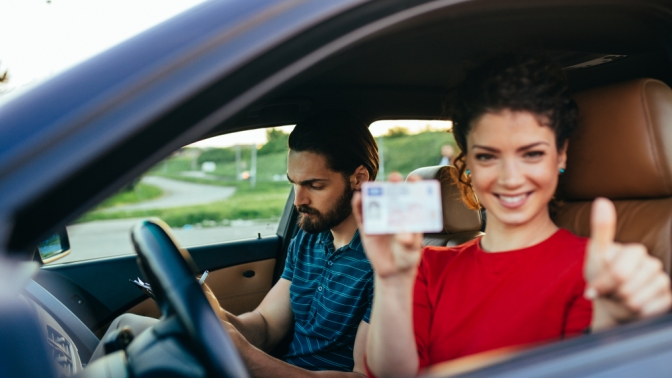Starting your journey to becoming a driver can be both exciting and nerve-wracking. If you’re about to begin driving lessons Manchester UK, it’s essential to know what to expect and how to make the most of the experience. Driving lessons are designed to teach you not only the practical skills of operating a vehicle but also the theoretical knowledge you need to become a safe and responsible driver. In this guide, we’ll cover the key things every beginner should know before they start their driving lessons.
1. You Need a Provisional License
Before you can start any driving lessons, you’ll need to obtain a provisional driving license. This is a legal requirement in the UK, and you won’t be allowed to get behind the wheel without it.
How to Get Your Provisional License:
- Apply Online: You can apply for your provisional license through the DVLA website. The process is straightforward and usually takes a couple of weeks to receive your license.
- What You’ll Need: To apply, you’ll need a valid ID (such as a passport), proof of your address, and your National Insurance number.
Make sure to bring your provisional license with you to your first lesson, as your instructor will need to check it before you begin driving.
2. Expect to Start Slow
Your first driving lesson won’t involve complicated maneuvers or high-speed driving. Instead, your instructor will likely start by introducing you to the car’s controls and helping you get comfortable behind the wheel.
What You’ll Learn:
- Basic Controls: You’ll get familiar with the steering wheel, pedals, gear stick (if you’re learning in a manual car), and dashboard indicators.
- Starting and Stopping: Your instructor will teach you how to start the car, accelerate smoothly, and bring the vehicle to a controlled stop.
- Moving Off: You’ll practice pulling away from a stationary position and stopping in a safe manner, often on quiet roads with little traffic.
Don’t worry if you don’t get everything right the first time—your instructor will guide you through each step at a comfortable pace.
Also Read: The Future of Driving with Smart, Eco-Friendly Cars
3. You’ll Need to Study for the Theory Test
While driving lessons focus on practical skills, you’ll also need to pass a theory test to get your driving license. The theory test covers the rules of the road, road signs, and hazard perception.
How to Prepare:
- The Highway Code: Make sure to read and understand the UK Highway Code, which contains all the essential rules and regulations for safe driving.
- Practice Tests: There are plenty of online resources and apps that offer mock theory tests. These are a great way to test your knowledge and get used to the format of the real test.
- Hazard Perception: The hazard perception test is a key part of the theory exam. It involves watching video clips and identifying potential hazards. Practice is essential to get a good score.
By studying regularly, you’ll be well-prepared to pass your theory test and move closer to getting your full license.
4. Choose Between Manual or Automatic Lessons
Before starting your driving lessons, you’ll need to decide whether you want to learn in a manual or automatic car. Each option has its advantages, so it’s important to choose the one that best suits your needs.
Manual vs. Automatic:
- Manual Lessons: Learning in a manual car gives you more flexibility, as you’ll be licensed to drive both manual and automatic vehicles. However, mastering gear changes and clutch control can take longer.
- Automatic Lessons: Automatic cars are easier to drive because there’s no need to worry about changing gears. This can be especially helpful for nervous learners or those who want to focus more on road awareness and less on technical car control.
Deciding between manual and automatic driving lessons is a personal choice, so consider what you feel most comfortable with and what will be most useful for you in the future.
5. Don’t Expect to Pass Right Away
It’s important to understand that passing your driving test takes time and practice. On average, it takes between 40 and 45 hours of professional driving lessons, plus around 20 hours of private practice, to be ready for the test.
Tips for Success:
- Be Patient: Learning to drive is a process, and it’s normal to feel frustrated at times. Take it one lesson at a time and focus on making gradual improvements.
- Take Mock Tests: Your instructor may offer mock tests to help simulate the real driving test. These are a great way to build confidence and identify areas where you need more practice.
- Practice Outside of Lessons: If possible, practice driving with a qualified driver outside of your lessons. This extra time behind the wheel will help reinforce what you’ve learned and speed up your progress.
Remember, every learner progresses at their own pace, so don’t feel pressured to rush the process.
6. Building Confidence Takes Time
One of the most common challenges new drivers face is building confidence behind the wheel. It’s normal to feel nervous during your first few lessons, but with practice, you’ll gradually start to feel more comfortable.
How to Build Confidence:
- Stay Calm: Remember that your instructor is there to help you, and they won’t push you beyond what you’re ready for. Stay calm and focus on one task at a time.
- Celebrate Small Wins: Whether it’s mastering a smooth start or successfully completing a turn, acknowledge your progress. Every small win is a step toward becoming a more confident driver.
- Ask Questions: If you’re unsure about something, don’t hesitate to ask your instructor. They’re there to answer your questions and help you improve.
Building confidence is a gradual process, but with each lesson, you’ll get more comfortable and capable.
7. Your Instructor Will Guide You Every Step of the Way
One of the key advantages of taking driving lessons with a qualified instructor is the level of guidance and support they provide. Your instructor will tailor each lesson to your progress, ensuring that you’re learning at a pace that works for you.
What to Expect from Your Instructor:
- Constructive Feedback: Your instructor will give you regular feedback on your driving, pointing out areas for improvement while also highlighting what you’re doing well.
- Step-by-Step Progression: Each lesson will build on the previous one, gradually introducing new skills as you gain more confidence and experience.
- Mock Tests and Preparation: When you’re ready, your instructor will help you prepare for the practical test by offering mock tests and focusing on any weak areas.
Your instructor’s experience and expertise will be invaluable in helping you become a safe and confident driver.
Conclusion
Starting driving lessons in Manchester UK is an exciting milestone for any beginner. By understanding what to expect, preparing for both practical lessons and the theory test, and staying patient with your progress, you’ll set yourself up for success. Remember, learning to drive takes time and practice, but with the right instructor and a positive mindset, you’ll be well on your way to becoming a confident and capable driver.
Join the top driving school in Manchester, Impulse Driving School. Our ADI-approved instructors will guide you to success in your driving test in just 4 weeks!



